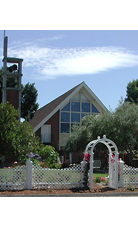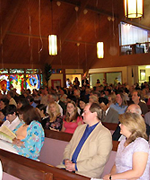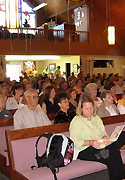|
|
Stewardship What is stewardship? Christian stewardship begins with the premise that everything in the world belongs to God. The resources we have and even our own selves belong to God. God had entrusted us with many gifts, and the appropriate response from us is to manage them the best we can. Stewardship is about lifestyle - making choices in all aspects of our lives that enable us to live with a spirit of thanksgiving and gratitude for God's love and generosity. Stewardship doesn't mean that all Christians will make the same choices about how to spend their time and money, about jobs and vocations, or about sharing their gifts and talents. Rather stewardship means that we all do our best with what we're given, and God will make good use of a diversity of gifts from all kinds of people. Stewardship is a way for us to participate in the work of Christ and experience the joy of sharing ourselves, our talents, and our resources with others. What is the key to faithful stewardship? Ultimately stewardship is about relationships - relationship with God, relationship with each other, and relationship with God's creation. As Christians we are people who have been called into relationship with God through Christ by the power of the Holy Spirit. This relationship transforms our understanding of ourselves and in turn is at the core of all our relationships. Our call to be stewards is understood within the context of these relationships. When the choices we make nurture and respect these relationships, then we know we are acting as faithful stewards of all that God has given us. Who are we as stewards? • We are stewards of our spiritual life, deepening our relationship with God through worship, prayer, meditation, reading and studying scripture. • We are stewards of our minds and bodies, understanding that God's love for us requires us to take care of ourselves and see the beauty that God has placed in us. • We are stewards of the time God has given us on this earth, striving to find healthful balance in work, rest, play, worship and service. • We are stewards of the wealth that comes to us from God's abundance, tending to our own needs yet also trusting • We are stewards of our gifts and talents, identifying them and realistically assessing how we can best put them to work for our own growth as Christians and at the same time to share God's love with others. • We are stewards of one another, freely accepting the responsibility to relate to those around us in loving, open and compassionate ways, including our enemies. • We are stewards of the Church, the community in which God placed us to grow together in faith and understanding, and to serve in ministry and mission. • We are stewards of the earth, its natural resources and all living things. God placed us in relationship with all creation and entrusted us with its care and management. • We are stewards of truth, embracing and living out the principles of the Kingdom as lifted up by Jesus Christ and standing always for justice, righteousness, peace and fidelity. • We are stewards of the Peace of Christ, letting it rule our hearts and offering it to others in love and humility "Like good stewards of the manifold grace of God, serve one another with whatever gifts each of you has received. 1 Peter 4:10 About Giving Pledging Pledging is a commitment to give St. Luke Lutheran Church a specified amount of money in the coming year. But more than that, pledging is a commitment to yourself and to God to be an intentional giver. Why is pledging better than simply putting money in the plate each Sunday? You'd have a hard time planning your family's expenses for the next year if you had no idea how much you were going to earn. St. Luke is in the same position. You can help us plan ahead by letting us know what resources we're going to be able to depend on next year. Moreover, making a pledge on future income will help you maintain your inclination to be generous over the natural temptation to use the money for other purposes. Pledging focuses your giving. How much should I give? The biblical mandate is 10% of your income. This includes all charitable giving as well as your pledge to St. Luke. If you are not comfortable with 10%, perhaps it is a goal you could work toward. What's most important is that you consider your pledge as a percentage of your income so that the level of your giving is not arbitrary but be a prayerfully considered percentage of your income. How and when do I pay? There are lots of ways to make your payment. You could give it in an envelope in the Sunday Offering plate. You can make one lump payment, 2 half-year payments, 4 quarterly payments or 12 monthly payments. You can give appreciated securities. You can even pay by credit card. Whatever works best for you is the one you should choose. Discipleship - The Master's Commission "And Jesus came and spoke to them, saying, "All authority has been given to Me in heaven and on earth. Go therefore and make disciples of all the nations, baptizing them in the name of the Father and of the Son and of the Holy Spirit, teaching them to observe all things that I have commanded you..." Matthew 28:18-20 It has been said "Give a man a fish you will feed him for a day. Teach a man to fish and you will feed him for a lifetime." Jesus has charged us as followers to make disciples of all nations. This involves much more than leading people in a sinner's prayer, shaking their hand, then sending them on their merry way. Not everyone who is saved is a disciple, but every disciple is saved. In like fashion, we must take up this mantle of responsibility to make disciples or as Jesus said, "Follow Me, and I will make you fishers of men." I am reminded of the story of Lazarus found in John chapter 11. After Jesus performs the miraculous in bringing Lazarus back from the dead after 4 days in the tomb, he says something very important: "When he had said this, Jesus called in a loud voice, Lazarus, come out!" The dead man came out, his hands and feet wrapped with strips of linen, and a cloth around his face. Jesus said to them, "Take off the grave clothes and let him go." While this clearly demonstrates God's role in bringing people out of darkness into His marvelous light, it also show us our responsibility to remove the grave clothes (old habits, worldliness) from the newly formed Christian. What does the Bible say about Giving? "On the first day of the week let each of you put aside and save, as you may prosper" (I Corinthians 16:2) "Freely you have received, freely give" (Matthew 10:8) "First they gave themselves to the Lord" (II Corinthians 8:5) "O Lord our God, all this abundance that we have provided for building you a house for your holy name comes from your hand and is all your own" (I Chronicles 29:16) "For where you treasure is, there your heart will be also" (Luke 12:34) Offering Envelopes When you become a member at St. Luke, you should receive Offering Envelopes that you can use each Sunday to put in the Offering collection plate. There are also envelopes available in the pew pockets. When you use the Offering Envelopes, you are assigned an Offering number that is pre-printed on the envelopes. This number is used to record your contributions throughout the church year. You will receive a Quarterly Giving Statement for your personal financial records. If you would like to receive Offering Envelopes, please contact the church office at (408)736-9216. What is an endowment and why does St Luke have one? An endowment is a collection of funds or property that are donated to an institution in order to produce income over the long term. In 2012, St Luke formally established an Endowment Committee whose purpose is to receive, manage, and distribute funding for scholarships, capital improvements, and missions. This committee then established a fund with Lutheran Community Foundation (now inFaith Community Foundation) with $25K seed money. This money along with additional donations given over time was invested in a growth portfolio and today is worth much more. It is significant to note that these endowment funds are separate from the church's operating funds and distribution of these funds must be agreed to by both council and the members of the congregation. The intent is to only distribute interest and income and not to reduce the endowment fund principle in any way. That way, as the principle grows over time due to gifts and bequests, the distributions will also grow. Options for donating to the fund include cash, real property, life insurance proceeds, securities, a share of the residue of an estate, or the remainder of a trust. When donors give to the endowment fund, they are creating a legacy that can last for years to come. To put it another way, donors are providing ongoing support to the congregation and to the community by empowering the Endowment Committee to manage and distribute the funds in order to fulfill St Luke's mission. To see a summary of some key portions of the Continuing Resolution establishing the Endowment, please click here. |
|










